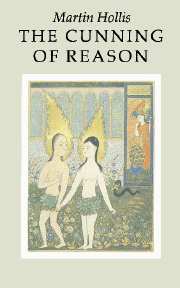Book contents
- Frontmatter
- Contents
- Preface
- 1 The sovereign artificer
- 2 Rational choice
- 3 Norms and institutions
- 4 The Cunning of Reason I: unintended consequences
- 5 Motivation
- 6 External and internal reasons
- 7 Rational Expectations
- 8 Maximising and satisficing
- 9 The Cunning of Reason II: functions and rules
- 10 Reasons and roles
- 11 Rationality and understanding
- 12 The Cunning of Reason III: self and society
- Bibliography
- Index
8 - Maximising and satisficing
Published online by Cambridge University Press: 15 December 2009
- Frontmatter
- Contents
- Preface
- 1 The sovereign artificer
- 2 Rational choice
- 3 Norms and institutions
- 4 The Cunning of Reason I: unintended consequences
- 5 Motivation
- 6 External and internal reasons
- 7 Rational Expectations
- 8 Maximising and satisficing
- 9 The Cunning of Reason II: functions and rules
- 10 Reasons and roles
- 11 Rationality and understanding
- 12 The Cunning of Reason III: self and society
- Bibliography
- Index
Summary
Maximisation provides the moving force of economics. It asserts that any unit of the system will move towards an equilibrium position, as a consequence of universal efforts to maximise utility or returns. Maximisation is a general basic law that applies to the elementary units and, by the rules of composition, to larger and more complicated collections of those units.
(Krupp (1965), p. 69)These robust sentences by Sharman Roy Krupp capture an exciting Leibnizian vision of the economy as a system guided by Sufficient Reason towards Pre-established Harmony. Each agent maximises, each larger unit maximises in consequence and, by the rules of composition, the whole heads for equilibrium. By now, however, doubts are starting to obtrude both about the moving force and about the rules of composition. Yet I would be sorry to lose the vision altogether. The next two chapters are an attempt to see how much of it can withstand the substitution of satisficing for maximising and of pluralism for unified harmony.
I have delayed discussing maximisation until now, so as to be able to call on the subversive kind of uncertainty introduced by expectations. While uncertainty is treated as if it were a form of ignorance about what nature will do next, it makes fair sense to analyse rational decisions as those based on subjective probabilities which match objective probabilities. But, if a crucial uncertainty stems from ignorance of what people will do next, because each agent cannot decide without knowing what others expect others to decide, it makes abruptly less sense to analyse rational decision in terms of approximating to the objectively right solution.
- Type
- Chapter
- Information
- The Cunning of Reason , pp. 113 - 129Publisher: Cambridge University PressPrint publication year: 1988



